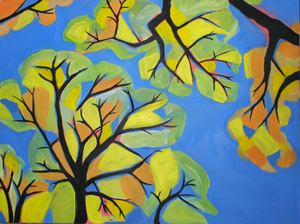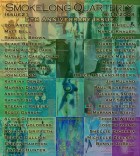We were transplanted Pennsylvanians who understood the value of fresh fruit. The rental house had lemons, oranges, tangelos, loquats, figs. My mother let me take the bedroom that faced the orchard.
I saw him the second week. It was the middle of summer. He lay on a striped beach towel between our two yards, near the loquat tree. I went outside to say hello. I was not exactly shy, though my voice sounded it. An elaborate coconut scent surrounded him. He smiled and asked me to join him. He was tanning, though his body was already brown.
I went inside for my SPF 50 Coppertone, grabbed a beach towel, and went out to where he lay. I asked what his ancestry was, admiring his black tilted eyes and dark, thick skin.
Sioux, he said. He was one quarter Native-American, one-quarter Spanish, one-quarter French, and one-quarter Norwegian. No surprise that he’d been exotically grafted.
He told me not to put on the sunscreen, offered me his wonderful smelling basking oil instead. He said I was pretty, but would fit in better with a really good tan.
I burn quickly from the sun, and mother had warned me not to try. My dad never told me to be careful about anything, but he was dead now. I knew that Mom’s voice had gotten too strong.
He told me not to worry about sunburns, assured me that my freckled skin would adapt, just like his. He asked me if I would be interested in meeting him again that night when our parents were asleep.
Climb out a window and you’ll make no sound, he whispered, as if there were spies in the loquat tree.
That night I put on my nightgown and went to bed. My skin was stinging and bright red. When I touched it, it turned white for a second, then bright red again. I took two aspirin. I couldn’t wait to see him again, under a softer light. I was not too young to understand what this meant.
Under the night sky, he looked as dark as a hazelnut. His eyes were thirsty. We started laughing about nothing, rolling on the ground and grabbing the grass—flicking it at each other.
It’s warm tonight, he said, unbuttoning my shirt.
He ran his hands over my breasts, my stomach.
What’s here? he whispered. He put his finger inside my bellybutton, and scooped out a small fruit seed. He laughed.
I went crazy eating tangerines today, I said. I was glad it was dark because my face felt hot. It seemed I could not get enough citrus flesh.
Juice, he said, moving his fingers inside my jeans and into a place I couldn’t believe.
***
The next night we met again. When we took off our clothes, he stroked my irritated skin curiously, as if offering first aid.
Soon you’ll get tan, then brown, then perfect, he said.
What is it with the tan thing? I asked. I really wanted to know.
He flinched and stiffened. My skin got cold.
Bugs, he said, swiping at the air. I realized my family’s bad fortune could slip over me like a dark curtain.
We lay silent for a while listening to the sounds of night. I decided to tell him about a friend of mine… a girl I knew, whose father insisted their family move to Alaska. He worked for the telephone company because that was where the money was.
She’s never even had a boyfriend, I said.
Or fresh fruit, he added, bringing my hands to the place above his thighs. We did things new to me that I’d never forget.
***
A week later, he disappeared. I found out that he’d been visiting his aunt next door. He lived somewhere in Wisconsin. I had been so sure he was a Californian… that meeting his strange expectations meant belonging.
It was our first winter in California—just mom and I. No cousins, no aunt and uncle, no grandparents to visit. I sent them postcards of my beautiful new land. Pictures of palm trees lined up like chorus girls. Huge waves and white beaches. Bikinied women the color of the dark pine furniture we left back home.
My chronic sunburn peeled in tiny pieces like snow.



 The core workshop of SmokeLong Fitness is all in writing, so you can take part from anywhere at anytime. We are excited about creating a supportive, consistent and structured environment for flash writers to work on their craft in a community. We are thrilled and proud to say that our workshop participants have won, placed, or been listed in every major flash competition. Community works.
The core workshop of SmokeLong Fitness is all in writing, so you can take part from anywhere at anytime. We are excited about creating a supportive, consistent and structured environment for flash writers to work on their craft in a community. We are thrilled and proud to say that our workshop participants have won, placed, or been listed in every major flash competition. Community works.